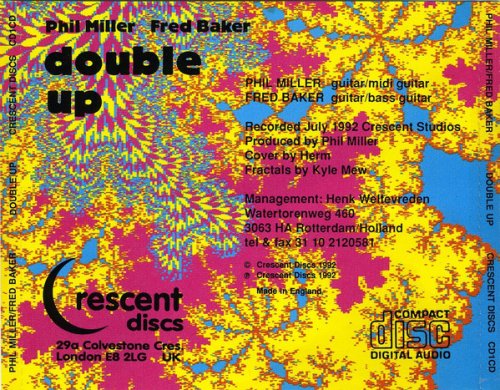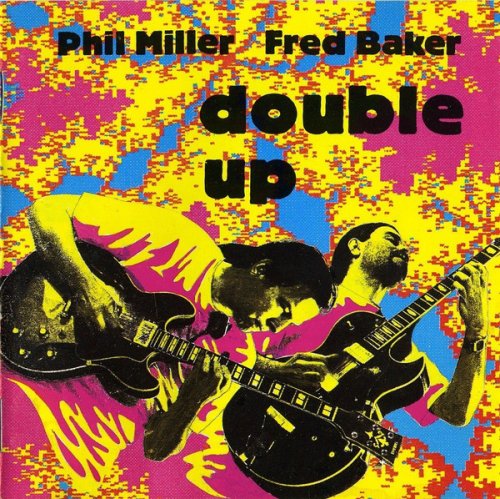
Phil Miller / Fred Baker - Double Up (1992)
BAND/ARTIST: Phil Miller, Fred Baker
- Title: Double Up
- Year Of Release: 1992
- Label: Crescent Discs
- Genre: Jazz-Rock, Prog Rock
- Quality: Flac (image, .cue, log)
- Total Time: 59:04
- Total Size: 228 Mb (scans)
- WebSite: Album Preview

Tracklist:
1. Above & Below (Miller) 9:34
2. Underdub (Miller) 6:10
3. For Christine (Baker) 6:12
4. Second Sight (Miller) 4:10
5. Eastern Region (Miller) 6:03
6. Loggerheads (Baker) 8:07
7. Calyx (Miller) 6:02
8. Green & Purple (Miller) 6:54
9. God Song (Miller) 5:48
Line-up::
Phil Miller - Guitar, MIDI Guitar
Fred Baker - Guitar, Bass Guitar
When Miles Davis and like-minded jazzmen began to express their appreciation of rock (as well as funk) in the late '60s, post-bop gave way to fusion -- a revolution that jazz purists and bop snobs were still complaining about 40 years later (much like the aging folk purists who still insist that Bob Dylan never should have gone electric). The fact that fusion started in the United States doesn't mean that it hasn't had some talented representatives in England, and three of the British guitarists who have been fusion proponents since its early years are John McLaughlin, Allan Holdsworth, and Phil Miller. Although Miller isn't as big a name in fusion as McLaughlin or Holdsworth, he has provided his share of worthwhile albums -- and Miller is in consistently strong form on Conspiracy Theories, which was recorded in London in 2004. Leading his band In Cahoots, Miller liberally incorporates rock and funk elements but maintains an improvisatory jazz mentality throughout the 70-minute CD. Jazz purists would argue that tracks like "Freudian Triode," "Flashpoint," and "Crackpot" aren't really jazz and are simply instrumental rock with jazz overtones. But the fact that Miller likes rock and funk (both of which share jazz's blues heritage) and uses a lot of electric instruments does not mean that Conspiracy Theories lacks a jazz aesthetic; this album doesn't have a '50s bop aesthetic, but it has a jazz aesthetic nonetheless -- and the truth is that if he took away the rock and funk elements, didn't use electric bass or electric keyboards, and went for an acoustic-oriented approach, Miller could have made Conspiracy Theories a straight-ahead post-bop album. A jazz musician, however, doesn't have to be straight-ahead to be legitimate, and Conspiracy Theories finds Miller (who turned 55 in 2004) continuing to shine as both a guitarist and a composer.
As a ISRA.CLOUD's PREMIUM member you will have the following benefits:
- Unlimited high speed downloads
- Download directly without waiting time
- Unlimited parallel downloads
- Support for download accelerators
- No advertising
- Resume broken downloads


